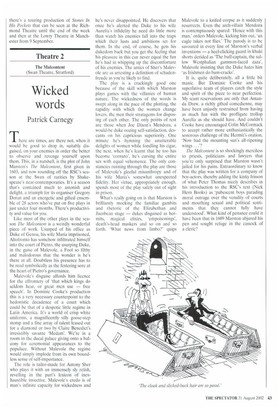Wicked words
Patrick Carnegy There are times, are there not, when it would be good to drop in, suitably disguised, on your enemies in order the better to observe and revenge yourself upon them. This, in a nutshell, is the plot of John Marston's The Malcontent, first given in 1603, and now rounding off the RSC's season at the Swan of rarities by Shakespeare's near-contemporaries. It's a season that's contained much to astonish and delight, a triumph for its organiser Gregory Doran and an energetic and gifted ensemble of 28 actors who've put on five plays in just under four months. There's productivity and value for you.
Like most of the other plays in the season The Malcontent is a weirdly wonderful piece of work. Usurped of his office as Duke of Genoa, his wife Maria imprisoned, Altofronto has somehow infiltrated himself into the court of Pietro, the usurping Duke, in the guise of Malevole, a Fool so filthy and malodorous that the wonder is he's there at all. Doubtless his presence has to be read symbolically as the festering sore at the heart of Pietro's governance.
Malevole's disguise affords him licence for the effrontery of that which kings do seldom hear, or great men use — free speech'. In Dominic Cooke's production this is a very necessary counterpoint to the hedonistic decadence of a court which could be that of a despotic little regime in Latin America. It's a world of crisp white uniforms, a magnificently silly goose-step stomp and a fine array of talent leased out for a diamond or two by Claire Benedict's irresistibly savante `Medam'. We're in a room in the ducal palace giving onto a balcony for ceremonial appearances to the populace. Without Malevole the regime would simply implode from its own boundless sense of self-importance.
The role is tailor-made for Antony Sher who plays it with an immensely sly relish, revelling in the part's lexicon of inexhaustible invective. Maley°le's credo is of man's infinite capacity for wickedness and he's never disappointed. He discovers that once he's alerted the Duke to his wife Aurelia's infidelity he need do little more than watch his enemies fall into the traps which their lusts and ambitions set for them. In the end, of course, he gets his dukedom back but you get the feeling that his pleasure in this can never equal the fun he's had in whipping up the discomforture of his enemies. The antics of Sher's Malevole are as arresting a definition of schadenfreude as you're likely to find.
The play is a crackingly good one because of the skill with which Marston plays games with the villanies of human nature. The wickedness of the words is swept along in the pace of the plotting, the rapidity with which the women change lovers, the men their stratagems for disposing of each other. The only points of rest are those when Joe Dixon's Mendoza, a would-be duke oozing self-satisfaction, descants on his capricious superiority. One minute he's hymning the unutterable delights of women while fondling his cigar, the next, when he's learnt that he too has become `cornuto', he's cursing the entire sex with equal vehemence. The only constancies running through the play are those of Maley°le's gleeful misanthropy and of his wife Maria's somewhat unexpected fidelity. Her virtue, appropriately enough, spends most of the play safely out of sight in prison.
What's really going on is that Marston is brilliantly mocking the familiar gambits and rhetoric of the Elizabethan and Jacobean stage — dukes disguised as hermits, magical elixirs, 'empoisonings', death's-head maskers and so on and so forth. 'What news from limbo?' quips Malevole to a knifed corpse as it suddenly resurrects. Even the arch-villain Mendoza is contemptuously spared: 'Hence with this man,' orders Malevole, kicking him out, 'an eagle takes not flies,' The parody is to be savoured in every line of Marston's verbal inventions — a heel-clicking guard in khaki shorts derided as 'The buff-captain, the sallow Westphalian gammon-faced zaza', Malevole insisting that the Duke hates him 'as Irishmen do bum-cracks'.
It is, quite deliberately, all a little bit manic. But Dominic Cooke and his superlative team of players catch the style and spirit of the piece to near perfection. My scant reservations are only that Amanda Drew, a richly gifted comedienne, may have been unjustly restrained from having as much fun with the profligate trollop Aurelia as she should have. And couldn't Cooke have encouraged Colin McCormack to accept rather more enthusiastically the sonorous challenge of the Hermit's oration, 'Now had the mounting sun's all-ripening wings .'?
The Malcontent is so shockingly merciless to priests, politicians and lawyers that you're only surprised that Marston wasn't jailed for his pains. Extraordinary to know that the play was written for a company of boy-actors, thereby adding the kinky frisson of what Peter Thomas nicely describes in his introduction to the RSC's text (Nick Hem n Books) as 'pubescent boys parading moral outrage over the venality of courts and mouthing sexual and political sentiments that they cannot fully have understood'. What kind of penance could it have been that in 1609 Marston abjured his pen and sought refuge in the cassock of a cleric?


























































 Previous page
Previous page